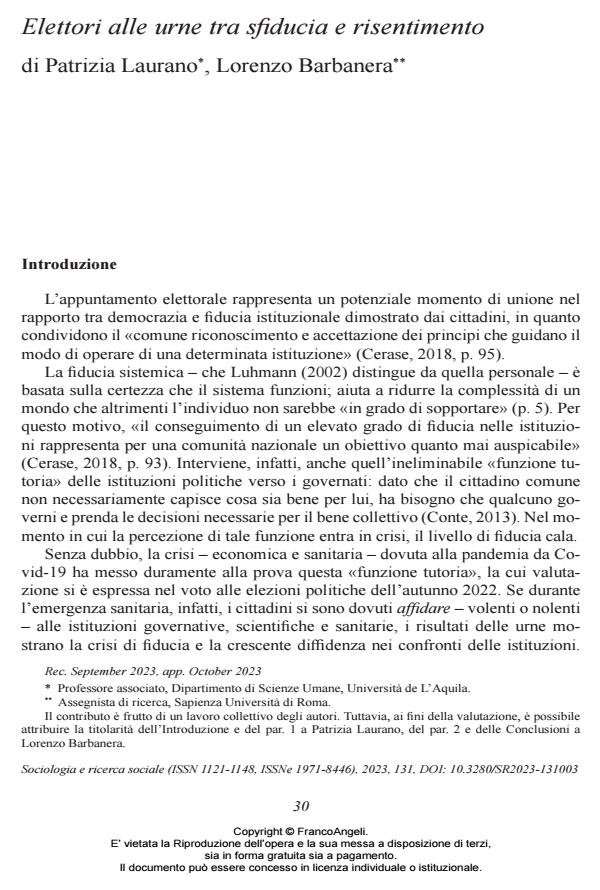Voters at the polls: mistrust and resentment
Journal title SOCIOLOGIA E RICERCA SOCIALE
Author/s Patrizia Laurano, Lorenzo Barbanera
Publishing Year 2023 Issue 2023/131
Language Italian Pages 20 P. 30-49 File size 244 KB
DOI 10.3280/SR2023-131003
DOI is like a bar code for intellectual property: to have more infomation
click here
Below, you can see the article first page
If you want to buy this article in PDF format, you can do it, following the instructions to buy download credits

FrancoAngeli is member of Publishers International Linking Association, Inc (PILA), a not-for-profit association which run the CrossRef service enabling links to and from online scholarly content.
Starting from a survey carried out soon after the 2022 parliamentary elections, this paper focuses on the confidence and resentment expressed by voters as pos- sible determinants of voting intentions. The work uses a web survey involving about 700 cases. The analysis shows the continuing lack of trust in the institutions and the most important social categories. At the same time, resentment is a nulli- fying factor, especially as an expression of a wider discontent linked to real life. In this sense, deprivation and existential insecurity give the electorate a specific attitude. As the empirical analyses suggest, this stance plays a significant role on the ideological level and, consequently, in voting choices.
- Z. Bauman (1999), In Search of Politics, Cambridge, Polity Press; tr. it. La solitudine del citta- dino globale, Milano, Feltrinelli, 2000.
- R. Cartocci (2008), «La costruzione politica del risentimento», Il Mulino, 57, 1, pp. 104-9, DOI: 10.1402/25983
- C. Castelfranchi (2013), «La paradossale “sfiducia” degli italiani nelle istituzioni», Sistemi in- telligenti, 1, pp. 113-21.
- F.P. Cerase (2018), «Trust in relations between citizens and public institutions», Amministrare, 1, pp. 91-116, DOI: 10.1442/91111
- R. Conte (2013), «Scambio politico o buongoverno? Le ali della fiducia», Sistemi intelligenti, 1, pp. 173-82.
- De Sio, L. Angelucci (2022), Le intenzioni di voto CISE/ICCP: un possibile «effetto Chur- chill» sul voto del 25 settembre?, https://cise.luiss.it/cise/2022/09/08/le-intenzioni-di-voto- cise-iccp-un-possibile-effetto-churchill-sul-voto-del-25-settembre/.
- I. Diamanti, M. Lazar (2018), Popolocrazia. La metamorfosi delle nostre democrazie, Roma- Bari, Laterza.
- Donà (2022), «The rise of the Radical Right in Italy: the case of Fratelli d’Italia», Journal of Modern Italian Studies, 27, 5, pp. 775-94, DOI: 10.1080/1354571X.2022.2113216
- Eurofound (2021), Living, working and Covid-19 (Update April 2021): Mental health and trust decline across EU as pandemic enters another year, Publications Office of the European Union, Luxembourg.
- P. Faggiano, V. Azzarita, E.D. Calò, M. Mongiardo (2019a), «Il circolo vizioso del risenti- mento: vittime e carnefici della campagna elettorale 2018: un focus su Lega e immigrazio- ne», Sociologia e ricerca sociale, 40, 119, pp. 76-100.
- M.P. Faggiano, L. Barbanera, E.D. Calò, M. Mongiardo (2019b), I sentimenti degli elettori: risentimento, fiducia nelle istituzioni, percezione dei problemi del Paese, in C. Lombardo,
- M.P. Faggiano (a c. di), E-lettori. I risultati di una web survey alla vigilia delle politiche del 2018 in Italia, Milano, FrancoAngeli.
- R. Hardin (2002), Trust and trustworthiness, New York, Russell Sage Foundation.
- R. Inglehart (1977), The Silent Revolution, Princeton, Princeton University Press; tr. it. La rivo- luzione silenziosa, Milano, Rizzoli, 1983.
- C. Lombardo (2019), La società oltre la politica?, in C. Lombardo, M.P. Faggiano (a c. di), E-lettori. I risultati di una web survey alla vigilia delle politiche del 2018 in Italia, Milano, FrancoAngeli.
- C. Lombardo, M.P. Faggiano (a c. di) (2019), E-lettori. I risultati di una web survey alla vigilia delle politiche del 2018 in Italia, Milano, FrancoAngeli.
- Luhmann (2002), La fiducia, Bologna, il Mulino.
- A.H. Maslow (1943), «A theory of human motivation», Psychological Review, 50, 4, pp. 370-96.
- I. Mingo, M.P. Faggiano (2020), «Trust in Institutions between Objective and Subjective Deter- minants: A Multilevel Analysis in European Countries», Soc. Indic. Res., 151, pp. 815-39,
- J. Mueller (1970), «Presidential Popularity from Truman to Johnson», American Political Science Review, 64, 1, DOI: 10.2307/1955610
- S. Nobile, L. Sabetta (2023), I legami fiduciari degli adolescenti come beni di mercato, in C. Lombardo, S. Nobile (a c. di), Tutti i clacson della mattina. Sociologia del populismo co- gnitivo, Milano, FrancoAngeli.
- P. Norris, R. Inglehart (2004), Sacred and Secular. Religion and politics Worldwide, Cambrid- ge, Cambridge University Press; tr. it. Sacro e secolare. Religione e politica nel mondo globalizzato, Bologna, il Mulino, 2007.
- O’Neill (2003), Una questione di fiducia, Milano, Vita e Pensiero.
- Oxfam (2020), Disuguitalia. Dati e considerazioni sulla disuguaglianza socio-economica in Ita- lia, https://www.oxfamitalia.org/wp-content/uploads/2020/01/Disuguitalia_2020_final.pdf.
- S.J. Pharr, R.D. Putnam (eds.) (2000), Disaffected democracies. What’s troubling the trilateral
- countries?, Princeton, Princeton University Press.
- M. Roccato (2021), «Fidarsi delle istituzioni e desiderare un governo antidemocratico», Il Mu- lino – Ricostruzioni, 4, ottobre-dicembre, pp. 68-77, DOI: 10.1402/102220
- A. Sgobba (2020), La società della fiducia. Da Platone a WhatsApp, Milano, Il Saggiatore.
- M. Sorice, N. Trino (2014), «La partecipazione politica fra crisi dei partiti e democrazia par- tecipativa», Sociologia e Politiche Sociali, 17, 2, pp. 59-76, DOI: 10.3280/SP2014-002004
- S. Tomelleri (2004), La società del risentimento, Roma, Meltemi.
- M. Valerii (2019), La notte di un’epoca. Contro la società del rancore: i dati per capirla e le idee per curarla, Milano, Ponte alle Grazie.
Patrizia Laurano, Lorenzo Barbanera, Elettori alle urne tra sfiducia e risentimento in "SOCIOLOGIA E RICERCA SOCIALE " 131/2023, pp 30-49, DOI: 10.3280/SR2023-131003